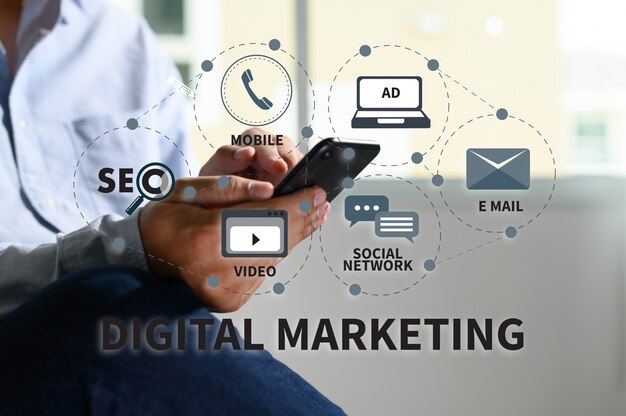In today’s digital age, digital marketing has become an essential tool for businesses of all sizes. With the rise of the internet and social media platforms, businesses can now reach their target audience more effectively and efficiently than ever before. This guide will walk you through the core aspects of digital marketing and how you can leverage them to grow your business.
What is Digital Marketing?
Digital marketing refers to any marketing efforts that use digital channels such as search engines, websites, social media, email, and mobile apps to promote products or services. It includes a wide range of strategies aimed at reaching and engaging customers online.
Key Components of Digital Marketing
1. Search Engine Optimization (SEO)
SEO is the process of optimizing your website to rank higher on search engine results pages (SERPs). By using relevant keywords, improving site speed, and providing valuable content, SEO helps drive organic traffic to your site, boosting visibility and attracting potential customers.
2. Content Marketing
Content marketing involves creating and sharing valuable content—such as blog posts, videos, infographics, and podcasts—to attract and engage your target audience. Quality content helps build trust and authority in your industry, which can lead to increased conversions.
3. Social Media Marketing
Social media platforms like Facebook, Instagram, LinkedIn, and Twitter allow businesses to connect with their audience in real-time. By sharing engaging content, running ads, and interacting with followers, social media marketing enhances brand visibility and fosters customer loyalty.
4. Pay-Per-Click (PPC) Advertising
PPC is a paid advertising model where businesses pay for each click on their ads. Platforms like Google Ads and social media sites offer targeted ad campaigns, allowing businesses to reach their audience based on demographics, interests, and behaviors.
5. Email Marketing
Email marketing involves sending targeted messages to potential or existing customers to nurture relationships and drive conversions. From promotional offers to newsletters, email marketing allows businesses to communicate directly with their audience, boosting engagement and loyalty.
6. Affiliate Marketing
Affiliate marketing is a performance-based strategy where businesses partner with affiliates (individuals or companies) to promote their products in exchange for a commission. This allows businesses to extend their reach through trusted influencers or bloggers.
7. Influencer Marketing
Influencer marketing involves collaborating with influencers who have a large and engaged following on platforms like Instagram, YouTube, or TikTok. Influencers promote products or services to their audience, increasing brand awareness and driving sales.
8. Online Public Relations (PR)
Online PR involves managing a brand’s online reputation by engaging with the media, bloggers, and influencers. It includes responding to online reviews, handling customer complaints, and creating positive press coverage to enhance brand credibility.
Benefits of Digital Marketing
1. Broader Reach
Unlike traditional marketing, digital marketing enables you to reach a global audience. You can connect with potential customers from different regions, giving you an opportunity to expand your business internationally.
2. Cost-Effective
Digital marketing can be more affordable than traditional advertising methods. With a variety of tools available, you can create cost-efficient campaigns that provide measurable results.
3. Better Targeting
Digital marketing platforms allow for advanced targeting based on factors such as location, interests, age, and behavior. This helps ensure your ads are seen by the right people, improving conversion rates.
4. Real-Time Results
With digital marketing, you can track the performance of your campaigns in real time. This allows you to adjust your strategies quickly based on data-driven insights, optimizing your results.
5. Increased Engagement
By interacting with customers on social media and responding to emails, digital marketing helps build a loyal audience. Increased engagement leads to higher customer retention and long-term success.
How to Create a Digital Marketing Strategy
1. Set Clear Goals
Define your goals before starting your digital marketing campaigns. Whether it’s increasing website traffic, boosting sales, or growing your social media following, having clear objectives helps guide your efforts.
2. Understand Your Audience
Knowing your target audience is key to successful digital marketing. Research their needs, preferences, and behaviors to tailor your campaigns effectively.
3. Choose the Right Channels
Decide on the digital marketing channels that align with your business goals and audience. If your target audience is active on social media, platforms like Instagram or Facebook may be ideal for promoting your products.
4. Create Quality Content
Develop content that resonates with your audience. Whether it’s informative blog posts or engaging videos, valuable content will attract more visitors to your site and improve your brand’s visibility.
5. Measure and Analyze Results
Track key performance indicators (KPIs) such as website traffic, engagement rates, conversion rates, and return on investment (ROI) to measure the success of your digital marketing efforts. Use tools like Google Analytics to monitor your progress and make data-driven decisions.
Digital Marketing Trends to Watch in 2024
1. Artificial Intelligence (AI) and Automation
AI-powered tools are becoming increasingly important in digital marketing. From chatbots that enhance customer service to automation tools that streamline campaigns, AI is revolutionizing the way businesses engage with their audience.
2. Video Marketing
Video content continues to dominate online marketing. Short-form videos, livestreams, and video ads are proving to be highly effective in capturing attention and increasing conversions.
3. Voice Search Optimization
With the rise of smart speakers, voice search is becoming a vital part of digital marketing. Optimizing your website for voice search can improve visibility and drive traffic to your site.
4. Personalization
Consumers expect personalized experiences. By leveraging customer data, businesses can deliver tailored content, product recommendations, and offers, improving engagement and sales.
5. Sustainability and Social Responsibility
As consumers become more conscious of environmental and social issues, businesses that align their digital marketing strategies with sustainability and corporate social responsibility (CSR) can attract a loyal, socially aware audience.
Conclusion
Digital marketing is a dynamic and ever-evolving field that offers countless opportunities for businesses to reach, engage, and convert their target audience. By leveraging the right strategies and staying up-to-date with the latest trends, you can build a strong online presence and achieve sustainable growth. Whether you’re new to digital marketing or looking to refine your approach, understanding the fundamentals will help you maximize your marketing efforts and stay ahead of the competition.



